‘Och, you’ve not even had it that long!’
‘Well, I’ve been travelling around Britain!’
‘Oh have ya? Well, I suppose we’ll let you away with it then, hehe!’ – Kimberley, Glasgow, on the death of a digital camera.
Violently, I’m forced awake after a couple hours’ sleep. Some vicious freeze has crept inside my clothes. My chest and legs feel like they’re dead. Some internal thermostat has clicked down to warning level and my mind’s frenzied with the adrenaline. The tent has acquired even more rainwater than before. The wind has blown over most of the coversheet, exposing the tent to the cruelty of the elements. And it is a fucking cold night out there.
It takes immense mental effort to lift myself up and move. The consequences of not moving and falling back asleep will hurt bad in a few hours. This is the worst situation I’ve ever been in physically.
What to compare it to? The despair one feels as a teenager, puking up a night’s self-abuse into the bottom of a toilet cistern, unsure if those stomach convulsions will ever end? Or the panic of losing a bag of personal belongings, a phone, a laptop, your ID and bank cards, in a public place, and that moment of realisation that you may not possibly find it again. Mentally, physically, you’re getting there.
I have no dry clothes and nowhere to go, and not much idea what really to do in this situation. The rain is still intent on washing away my tent, bicycle and anything else standing into the sea. So….
In my clothes pannier I find one t-shirt that’s only damp rather than wet. In my other bag there’s a dry jumper and hat. It’s a start. I dry myself with a damp towel and leap out of the tent to warm myself up with some desperate aerobic leaps. I undo the tent, jog a minute on the spot, and resituate it on an expanse of grass on the cusp of a running stream. It’ll make me fair game for the midges but at least I’ll be able to pin the coversheet to the ground.
The sleeping mat is dripping wet so I fling it out and open out the sleeping bag. It’s also bloody soaked, and the cold is crippling. I get about another hour’s sleep before the same thing happens again: freezing cold limbs, soaked to the skin. This time it’s my legs in the sleeping bag. It’s just so miserable. It’s too dark to consider cycling to warm myself up, so I undress and manage to find a dry place to rest my head on my wash bag, the last dry thing in my possession. Hunched and contorted in the most absurd position in a tent inch-deep in rain, in little more than a birthday suit, I manage to get just about enough sleep til dawnbreak. The sunlight is quite a relief.
Even the rain needs a tea-break. And I have something that’ll numb the cold: a can of deep heat spray little used since a bout of muscle cramps in Edinburgh. I spray it all over my body in order to numb wearing the freezing cold clothes I have, with the meticulousness of a teenager’s faith in the aphrodisiac qualities of a supermarket fragrance. It’s about half six or seven by the time I’m packed up and ready to leave. I eat the last of my supplies, some dried raisins and nuts and some rolls with processed cheese slices, and head out. My surroundings have a final surprise: I’ve slept the night in the middle of a front drive to a large country house. It’s a dark joke, but at least I can share in its expense. Shattered, I set off.
The road laces around Loch Fyne. In last night’s storms I’d mistaken it for the sea, but this morning some local deity has cast a spell over it. The heaviest of mists hovers just above the surface into the loch, and the sky looks ready to collapse into its own alabaster reflection. In the distance a cottage shimmers on the other side of the banks. Am I seeing the cottage itself, or its reflection, or something else entirely? With a body shaken by the onset of hypothermia, and a mind ravaged by stress and sleeplessness, this vista’s wrong, unreal. Is this not a portal into a parallel reality? I daren’t chance getting too close and disappearing in. I jump on the bicycle and began to cycle round, overawed by the majesty of these surroundings.
I’m following a road south towards Glasgow via Loch Lomond. It’s around sixty miles away. I put my mind to work, massaging it with happy thoughts and directing it to simply look up at the landscape rather than check the road signs. My digital camera’s another casualty, now filled with water and just about able to take photos.
I think of the people in the world I love, and live for, and I think of their love for me in return. With love comes responsibilities. I think of Mull and Iona, of Mendelssohn’s Hebridean overture, which I sing aloud and alter til it becomes a set of new songs again. Exhaustion and panic are dispelled by suspending all thought of the destination ahead. Just immerse oneself in what is to the left or right, to the moods of the skies, to the features of the distant horizon. The end point becomes not a place but a time: ride until you tire, or until a panorama emerges, then come to a halt. A speedometer or device to measure mileage is essential to achieving this zen state of cycling.
A dawn ceasefire’s been declared on the rain, mercifully, and the sun begins to emerge as the morning unfolds. The road undulatates then gradually rises up a hill, past a garden centre and brewery at the head of Loch Lyne. A young guy skulks about in an empty car park, looking preoccupied and cross til I greet him. He laughs, losing his guard, and his smile energises me. The morning sun is becoming bright and warm. I take off my helmet, giddy and enjoying the country roads. It gradually rises up a steep hill into the Arrochar Alps, a series of high verdant peaks in the Trossachs national park. I pass Argyll forest to my right, its trees densely packed together to the point that their arrow-like branches merge into one bewitching texture, like a 3D puzzle.
Eventually the heights terminate at a summit with the wonderful name of ‘Rest and be thankful’. It comes from words inscribed by soldiers building this road through the mountains back in 1753, carved into stone and comfort to all those who have walked or arrived by horse or bicycle since then. Today there’s a busy car park and a burger van with a bustling trade. Despite the extraordinary panorama around them, people seem to prefer eating their bacon butties and hot dogs inside their cars. Air conditioned, pine fragranced, a radio that plays reassuring pop or pipes up the travel news in Dundee.
It reminds me of bay at Dores, facing Loch Ness. A couple besides me held each other close for a minute, talking of their love of being outdoors. ‘I’m hungry!’, the guy announces a moment later. ‘Me too’, she replies. They head into the pub. Who knows how long they’d spent traveling to a view taken in for a couple of minutes.
Our estimations of our own self-sufficiency and freedom seem inflated. How long can we go without checking our phones, snacking on food, or the possibility of contact with other people? What is the longest amount of time we can just stay still? The stillness and silence required for religious or poetic reflection seems a stretch beyond our capabilities.
This view, this moment, this scene: it feels like it’s not been experienced until some piece of technology’s recorded and shared it. Personal experiences are uploaded to the internet, an ingenious information technology that now reflects the best and worst of our nature: cyber-bullying, revenge porn, digitised poker and impulse shopping sits alongside free communally-produced encyclopaedias, free news services, blogs sharing experiences of people one would never otherwise meet, forums and communities.
And data, just masses of it. How many photos of this same view exist on Google, Facebook or Flickr? Is there a need for any more? These days we can travel the world from our beds with the aid of Google’s street view.
Just as these images are all duplicates, I start to feel that these lives are duplicates of others, to a degree. Clothes, habits and ideas are inherited or imitated. Our development is a feat of social engineering, from the hospital clinic to the school, from the parenting manuals to kids’ television advertisements. It doesn’t begin with us, but our parents, and their parents. To even speak of ‘we’ or ‘our’ contradicts this standardised socialisation, which grows us all as individuals, each unique like everyone else.
Cocooned in our four by fours, air conditioning on max, belching without realising whilst scanning the series of commercial mailshots that comprise the bulk of our emails, the kinds of communal thinking that might produce or understand something like ‘rest and be thankful’ are so far away. Rest? We’re doing that. Be thankful? To whom, and for what? The greatest loss I’ve seen on this journey, and it comes to mind now as I approach a large urban centre where this loss is always apparent, is community.
To use Alastair McIntosh’s words, it’s a threefold loss of a community with the soil, community of human society, and community of the soul. That understanding of the terrain and nature is the basis for a symbiotic and ecologically sustainable relationship with it. Perhaps we know the names of our neighbours, but would we take time from our busy lives to help them build a shed, or care for them if sick? Yet until sixty years ago this seems to have been a fairly common practice in rural and urban communities.
And in an age of the most diluted ethical beliefs possibly conceivable, cynicism and an anti-religious Dawkinism are like an artery-clogging cholesterol that sluggens our mindfulness of the aliveness of others, of ourselves as alive through our connections with others. Express your self is the one ethical dictum to follow. Express your self in the vanity of narcissistic ambitions, in making a surplus of money one doesn’t need and keeping it for oneself, and speaking one’s opinions without care for the welfare of others. In all that credit-lent money we’ll need to spend on goods, services and study courses to find our selves, this parasitical economy of the individual and its wants is stimulated and grows. And in this supermarket of the soul, the one thing people seem more afraid of than the consequences of their own freedom. With so many choices, it can be impossible to make a choice. One either short-circuits for what’s easiest, or most popular, or one becomes paralysed with indecision and depression.
I see the time when some massive information company like Google works out how to code the human self, a continuity of human consciousness, and bank it in libraries that peter out into infinity. Our descendants might summon these spectres up and have them play on a screen for amusement at social gathering, through a program that reproduces those memories and habits and playing a series of probabilities of how we’d behave. Needless to say, each spectre would consider itself fully alive and unique.
There’d be a philosophical conundrum in deciding whether that spectre was indeed the very same intelligent being as us, and whether this being was still alive. The capacity to raise that question, and sufficiently answer it, might well beyond our capabilities by that stage. The increasing speeds of life and labour achieved in the last two hundred years have made us bored, and bored of being bored. Can we rest and be thankful without a bar of chocolate, or checking our emails, or cocooning ourselves in four by fours?
The road descends down into the small village of Arrochar, skirting the head of Loch Long. A closed chippy faces a large hotel where a queue of pensioners struggle up the staircase of a waiting coach. There’s a tea room open and I stop for some caffeine. In a friendly way, the owner invites me to rest my bike by the window to ‘keep an eye on it’. I’ve been leaving it unlocked for weeks and haven’t given its safety much thought, but it’s a reminder that heading south to be a little careful. One punter in the café complains about groups of cyclists taking up space on the roads. She’s oblivious to the fact that cyclists as road users have equal right to the road, if not more, given their larger number compared to a solo driver. The owner agrees, and without irony, says there’s times when he’d love to push the gas down when behind them. Conversation flits over personal finances followed by an extended rant about a mutual acquaintance on benefits who doesn’t ‘pay his way’.
The egoistic and aggressive nature of the conversation stands out from the banter of the Highlands and Islands. That, and the increasing amount of plastic rubbish strewn on roadsides as I carry on, are depressing signs that I’m returning to the modern world.
After Arrochar the road remains flat, but the traffic really increases when it becomes the A82 to Glasgow. Fortunately there’s a cycle path along Loch Lomond, following an old road that occasionally stumbles across a panorama of the loch. A group of Indian men stop to ask me, is this it?
The path itself is nice, but even the traffic of other cyclists heading in the opposite direction in Tour de France style clobber becomes distracting. The path confuses itself through an exclusive golf course where my bike chain falls off. I take a peek around Balloch, a village at the southern tip of Loch Lomond. I spy a McDonald’s drive-through. Again, the conditions of British reality are returning. I have no idea how to get to Glasgow other than along this frenzied A82, choked in Sunday afternoon traffic. It’s a dual-carriageway that zips along at some speed. Pot holes and pollutions indicate that I’m on the threshold of a major town. It’s not safe for cycling but there’s no alternative except getting on with it. Sixteen miles pass quickly along a samey dusty road. Erskine bridge looms in the distance, then the road runs through the run-down council blocks of Renton, past the semi-detached semis of Dumbarton, and into the suburbia of Glasgow.
It’s not a promising start. Traffic signs point to fish and chip shops, and I lose all sense of place as I pass rings of white and grey pebble-dash council housing. There are plenty of bus stops along the road, but each has a different kind of advertisement for McDonalds, surely an oversight in a city about to host the Commonwealth Games? The suburbs that comprise the northern edge of Glasgow’s conurbation have now begun but it’s hard to say where. The city itself feels like it begins as the A82 becomes the Great Western Avenue. As I cross a busy junction I enter Annielands, a bustling local area marked out by its jolly red-brick Victorian promenade of shops, I’m reassured, inspired.
The Victorian city basks in own aspirations, a beacon of imperial wealth and civility in an empire where the sun never set. Its merchants thrived through international trade, protected with the coercive power of the Royal Navy. In Glasgow they banked its profits, built its ships and created a city defined by a proud and coherent civic architecture.
It’s evident in the older yellow sandstone tenements that line the streets of the West End, sturdy and dignified, small details of craftsmanship built in, high ceilings and spacious rooms, suggesting dignity and equality. It’s evident in the grid arrangement of the city-centre, giving a feel of ease of motion and freedom within the carefully-contained sprawl of the city. It’s also evident in the countless civic buildings put aside for the pleasure and health of the people, like the large botanical gardens I pass on my left along Great Western Avenue, and Kelvingrove museum nearby, and others I’ll visit in the following days.
The West End is particularly energised by the large old university here and its impressive clocktower standing over the skyline. I pass trendy bars and cafes sitting alongside multicultural food stores on the stretch between the junctions at Hyndland road and St. George’s cross. I head through a motorway underpass by Cowcaddens station – Glasgow has a small tube service, nicknamed the ‘Clockwork orange’ for its shape and colour. I pass a Chinese restaurant-cum-snooker hall, just one of many Chinese businesses in the city, before threading down Cambridge street and into the centre of Glasgow’s shopping heart, Sauchiehall Street (and it’s pronounced Sokkiehol, and not Sorsyhall, as I discover…).
I mill among the crowds, looking up and around at the array of building styles here, at the well-heeled and intriguing characters in the crowds. I treat myself to a McFlurry and a bag of cookies and drift along the pedestrianised shopping avenue, listening into conversations and picking up clues about Glasgow. A middle-aged woman with a bright Mohican and tartan skirt slaps the bodhrain and caterwauls outside a betting shop, and passers-by do their best to ignore it. It’s lively yet relaxed, aged without being tatty, and charming without being too cocky or sure about it.
There’s also very few street beggars around. In the distance a buffoonish Commonwealth games volunteer overdressed in sports paraphernalia gestures to a collection of meek children to crowd around a plastic statue of a green alien. ‘Come on, I want you to shout as loud as you can and embarrass your mums! Glasgow puts the G in Great Britain!’
Before I’d arrived, Scottish national papers had been complaining on a daily basis about the number of police armed with guns appearing on the streets under the dubious excuse of protection for the games. Like with London’s own Olympics, it seemed that the occasion of a public festivity might just be a ruse to borrow capital to build profitable properties and to clear out the poor. But these games come at a seismic moment in Scotland’s politics. I’ll be asking Glaswegians about the games…
I head into Argos to get a replacement for my replacement camera. I’ve always been a bad liar, and it’s down to the friendliness and kind discretion of Kimberley that my waterlogged camera is replaced with something new. Whilst I’m waiting for the store to see if they have any other digital cameras in stock, we get talking about our lives, in that lovely that really is possible among strangers. I tell her that I grew up in Glasgow, on a place called Otago Street in the West End. ‘Near the university’ is the only clue I have about the place. My brother and I once had Glasgow accents, but we returned back to London when I was four.
She doesn’t quite know where I mean, but tells me about growing up in Milton Keynes then coming here as a child. They considered her English at school, but her accent sounds pretty local to me now. I ask her about some truths behind the stereotypes. Glasgow’s reputation precedes it. So far, everything of its dirty, dangerous and hard-living persona seems fallacious. ‘Haggis supper, Scotch pie, the chippy … Irn Bru!’ But no-one in Argos is sure where Irn Bru is made, and my innocent curiosity about going on a tour of the – bruwery? – elicits much laughter. She brings her colleagues over when I ask for tips for the town. ‘The West End, definitely, aye.’ That’s good enough for me. I pick up a Polaroid camera which quickly turns out to be bloody useless, taking very blurry photos with a date-stamp in the corner, then wander back along Sauchiehall Street. My Dad gives me a call and tips me to his choice boozers from his days working here. I can’t wait to explore them…
I follow Argos’s recommendation to head back into the West End, but not before I meet up with my new friend Tommi. Readers may recall that I met this friendly feller and his mates Alan and Dave and shared a few drams in Dornoch. Tommi’s invited me to stay with him and his wife Michelle. I cycle back to the botanical gardens and, after getting a little confused with some easy to follow directions, spot a man waving and smiling enthusiastically in the distance.
Tommi invites me in to their apartment and I’m introduced to his wife Michelle. It’s a lovely home and the welcome I’m given is warm, relaxed and just lovely. Don’t forget that I’m still in dirty and cold clothes and utterly exhausted. They feed me cheese sandwiches and tea and we talk about our mutual trajectories in life and in travels. These conversations are rich and insightful, but as they spill into the next day, I’ll recount them more then. They’re fascinating people.
A shower! A washing machine! A cup of tea!
The only thing clean to wear is one of Tommi’s outfits, but luck has it that we share the same proportions. Looking like two twin boys dressed by a mother, we head out for a lovely meal at Epicure’s down Hyndland road. Conversation is lively: the NHS, Finland, Celtic vs Rangers, religion in schools, the meaning of honesty, and the transformation of a life that comes with having children.
These conversations interweave with the stories of Glasgow more broadly, a city Tommi arrived at back in 1992 after meeting Michelle in Finland. He was a young footballer there, and has since worked in professional football or sports training. He and Michelle arrived in Glasgow as me and my family left. Our stories comprise different layers in the story of this fascinating city. Like Glasgow itself, these stories make up a unity, a coherent and shared experience. These streets, these buildings, these lives: I have two intensive days here to explore them.
Tonight we’re exploring Glasgow’s best pubs. After supper and drinks we jump into a taxi in search of the best pubs of Glasgow circa. 1990. The Halt Bar on Woodlands road is our first call but it’s recently closed. Briefly disappointed, we head into the Arlington where there’s live music, good beer and a great atmosphere. We get talking to the people around us and have a fine time, but there’s more to explore. We head next to the Horseshoe, a Glasgow institution just by the Central station. It’s a little quiet for a late Sunday night but the bar’s a fine place, and it’s a pleasure to spend time with Tommi chewing the cud. Glasgow’s good to us too. There’s a good welcome where we go. People are friendly and having a good time. It feels different to drinking in east London, where the drinks are double these prices and the sheer intensity of skint neurotic arts students and ambitious media careerists come together into a noxious miasma of insecure posturing and bad tattoos. It’s a good town.
A little drunk, we head back to the West End where Michelle and their nineteen year old son Nico are still up. Michelle calls for the caramel vodka and we all share a nightcap. We laugh and talk some more together into the wee small hours, enjoying ourselves and the many courses of our conversation, enriched by our diverse experiences and personalities.
Oh Glasgow. I could stay here some time and maybe never get bored…

































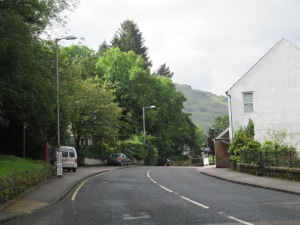















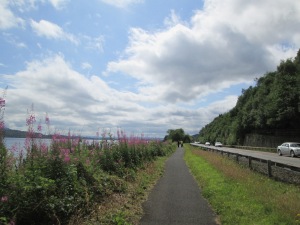
























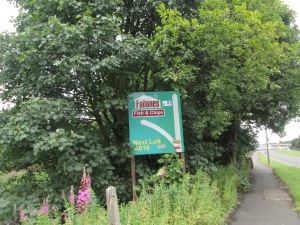














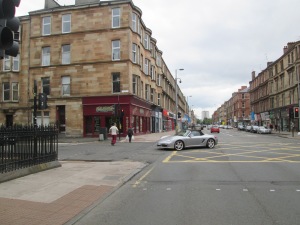



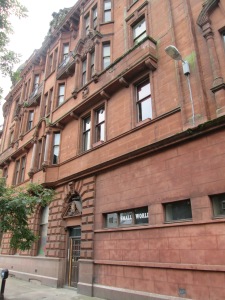





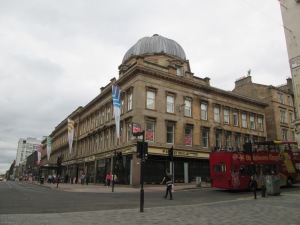







I loved your travel tale. I know I have had some from my visits to Glasgow. I still have yet to write. But the people are just wonderful once you make a friend it seems they are always your pals. I still have my friends from there now on FB from the mid 80s. It makes me miss the easy slow life there. Simple happiness in a very harsh and sometimes dirty and yes dangerous life in Glasgow. I survived alone with my wee girl of 5 yrs old, as I traveled there with her. When we left we both had Glaswegian accents. Coudna help it!:) Look forward to more of your travels.